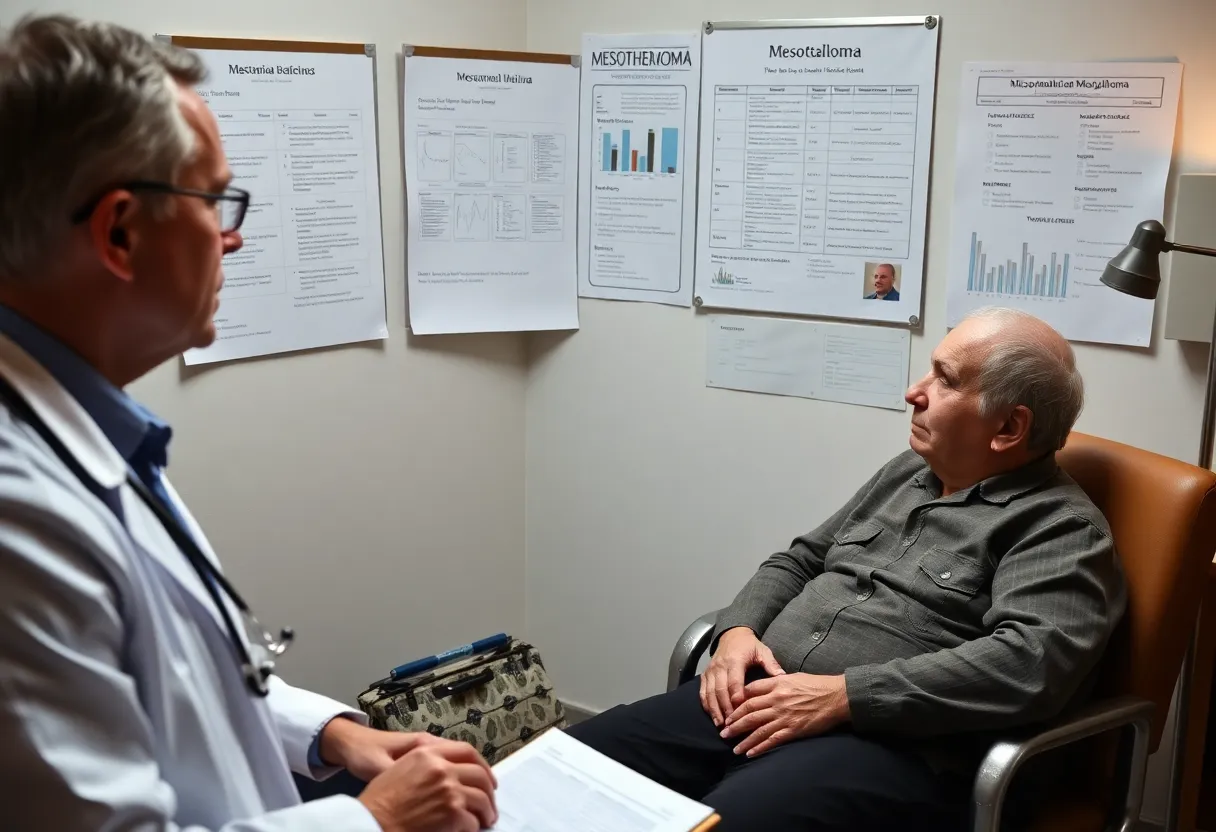News Summary
Exploring the evolving treatment options and strategies for managing mesothelioma, including surgery, chemotherapy, and immunotherapy.
Understanding the Complex Battle Against Mesothelioma
In the ever-evolving realm of mesothelioma treatment, patients and families are faced with myriad choices influenced by a variety of factors, including the stage of cancer at diagnosis, available therapies, and the expertise of the treating physician. As awareness about this aggressive cancer increases, so do the treatment options available for those diagnosed with malignant pleural mesothelioma.
Exploring Treatment Options
Patients diagnosed with early-stage mesothelioma (stages 1-2) frequently face a recommended treatment pathway consisting of surgery followed by chemotherapy. This aggressive early intervention may lead to improved outcomes and longer survival rates. On the other hand, those diagnosed at advanced stages (3-4) may also consider surgery, but the treatment landscape shifts to a combination of chemotherapy and immunotherapy. Chemotherapy treatments often include systemic agents like Alimta® and cisplatin, proving beneficial in extending patient survival.
The Role of Immunotherapy
Cutting-edge research is also delving into immunotherapy, utilizing drugs such as Opdivo® (nivolumab) and Yervoy® (ipilimumab). This form of treatment empowers the immune system to recognize and attack cancer cells, particularly demonstrating efficacy in advanced cases where tumors may not be operable. Utilizing a multimodal approach, a combination of these therapies is showing promise in combating mesothelioma’s unforgiving nature, potentially leading to better patient outcomes.
Importance of Clinical Trials
Furthermore, there is a growing emphasis on the critical role of clinical trials in mesothelioma treatment. These trials provide patients access to emerging therapies that are not yet widely available, creating a proactive pathway for treatment advanced by continual research and development. Participation in clinical trials can bring new hope to patients in search of viable alternative options.
The Prognosis Puzzle
Prognosis in mesothelioma patients is a complicated puzzle affected by numerous factors. The staging of the cancer at diagnosis is one of the most significant indicators of outcome possibilities. Those diagnosed earlier generally have better survival rates compared to those presenting with more advanced stages. However, additional elements such as the age and overall health of patients, along with specific tumor characteristics, play essential roles in determining personalized treatment recommendations.
Navigating the Healthcare Landscape
For families and patients traversing this challenging journey, access to patient advocates can make a significant difference. These dedicated professionals assist in navigating care options, connecting with specialists, and facilitating insurance claims. The journey after a mesothelioma diagnosis is daunting, but having reliable support can ease the burdens associated with treatment decisions and lifestyle adjustments during recovery.
Support Resources for Survivorship
As survival rates continue to improve with innovative treatments, access to support groups and coping mechanisms remains imperative. These resources offer an essential network for families and survivors, providing emotional support and shared experiences to aid in healing. Investing in palliative care is equally critical across all stages to enhance the patient’s quality of life and manage any potential treatment side effects.
Empowering Patients with Information
Patient empowerment, through informed understanding of treatment options, is vital. Encouraging patients to seek second opinions and challenge the boundaries of care can lead to improved outcomes. With the continuous evolution of treatment methodologies and the extensive expertise of specialized mesothelioma doctors, patients have the opportunity to explore various options tailored to their unique situations.
Looking Ahead
The future of mesothelioma treatment is promising, with ongoing research and advancements poised to elevate treatment standards. The commitment to continuously improving therapies can pave the way for enhanced survival rates and better quality of life. However, it is essential to remember that the information provided serves educational purposes and should not act as a substitute for professional medical advice, diagnosis, or treatment.
Deeper Dive: News & Info About This Topic
HERE Resources
The Hidden Dangers of Asbestos: What You Need to Know
Widow’s Plea for Memories of Rugeley B Power Station Workers
The Ongoing Saga of Hotel O: A Demolition Delayed by Asbestos Concerns
Penobscot County’s $2 Million Asbestos Dilemma: A Community’s Burden and Opportunity
Asbestos Concerns Spark Urgent Responses in School Renovations
Asbestos Violations Shake Oregon’s Construction Sector
Asbestos Removal Begins at Hutchinson High School
Chrysotile Asbestos Ban Sparks Fierce Legal Battle in Court
Cleanup Underway for $110 Million Housing Project in Downtown Dayton
The Asbestos Dilemma: New Report Creates Waves in NSW Management Policies



















